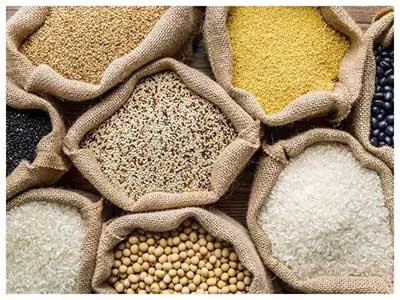Date: 26/12/2022
Relevance: GS-3: Indian Economy and issues relating to planning, mobilization of resources, growth, development and employment; Commodity Market in India.
Key Phrases: Regulation of commodity market, Commodity Trading, SEBI(Securities and Exchange Board of India), Spot Market, ETCDs(exchange-traded commodity derivatives), Derivative Market,, Regulatory Framework, Volatility, Inflation Control, Customer Protection, Edible oil price.
Context:
- Recently, SEBI has extended the ban on futures trading in seven agri commodities, including the derivatives of two produce which has been in force since December 20, 2021.
Key Highlights:
- The banned commodities are non-basmati paddy, wheat, chana (Bengal gram), mustard seed and its derivatives, soyabean and its derivatives, crude palm oil and moong (green gram).
- India imports over 60 per cent of its edible oil demand.
- Recently, The Securities and Exchange Board of India allowed
foreign investors to participate in Indian exchange-traded commodity
derivatives (ETCDs) through the FPI route, subject to conditions.
- FPIs are allowed to participate in cash settled non-agricultural commodity derivative contracts and indices comprising such non-agricultural commodities.
Why were they banned?
- They have been banned because spot market prices of these commodities
have been ruling higher over the last year and a half.The ban was initially
imposed after edible oil prices doubled last year.
- The Centre was flooded with complaints that too much speculation, particularly in mustard seed and its derivatives, resulted in high open market prices .
What are the reasons given for extending the ban?
- The Centre, in particular, and SEBI have extended the ban on concerns over inflation.
- While surging edible oil prices resulted in imposing the ban last year,
this year high rice and wheat prices have forced the Centre to extend the
same.
- Rice prices have increased by 7.5 per cent and those of wheat by 15.5 per cent in the past year.
- Though consumer inflation dropped to 5.9 per cent in November from the highs of over six per cent in the previous months, the RBI feels it is “down but not out”.
Commodity Market in India
- Commodity Market:
- Commodities market is either a physical or a virtual space, where interested parties can trade commodities (raw or primary products) at present or future date. The price is dictated by the economic principles of supply and demand.
- Regulator:
- Till 2015, the market was regulated by the Forward Markets Commission which was finally merged with SEBI to create a unified regulatory environment for commercial investing.
- Types of Commodity Market:
- Typically, commodity trading occurs either in derivatives
markets or spot markets-
- Spot markets are also known as “cash markets” or “physical markets” where traders exchange physical commodities, and that too for immediate delivery.
- Derivatives markets in India involve two types of commodity derivatives: Futures and Forwards; these derivatives contracts use the spot market as the underlying asset and give the owner control of the same at a point in the future for a price that is agreed upon in the present.When the contracts expire, the commodity or asset is delivered physically.
- Typically, commodity trading occurs either in derivatives
markets or spot markets-
- Advantages of commodity trading:
- Protection against inflation, stock market crash etc.
- High leverage facility
- Diversification
- Transparency
- Disadvantages of commodity trading:
- Not necessarily immune to inflation
- High Volatility
What has been the impact of the ban?
- Prices of mustard seed and its derivatives, soyabean and its derivatives, and crude palm oil have dropped.
- On the other hand, prices of moong and chana are ruling higher currently compared with the year-ago period as also those of rice and wheat.
- Oilseed prices have declined mainly since edible oil supplies are no more a concern.
Has the move affected commodity exchanges?
- The ban has affected the turnover of commodity exchanges.
- MCX has been affected by the ban on crude palm oil.
- NCDEX, on the other hand, has been badly hit by this since its monthly turnover halved to ₹10,053 crore in October from over ₹20,000 crore in January. It was conducting trading in the other six commodities.
Way Forward:
- Sometimes, these bans can be detrimental to the Indian commodity markets, severely denting the perception of ease of doing business in the country. Therefore, a detailed discussion and research should be carried out for such extension.
Conclusion:
- Commodity derivatives give important cues on price discovery and price risk management to the entire value chain participants across farmers, processors, millers, traders in physical markets and farmer producers’ organizations
Source: BusinessLine
Mains Question:
Q. What is commodity trading? Also, discuss the associated advantages as well as disadvantages of commodity trading? (250 Words).






















